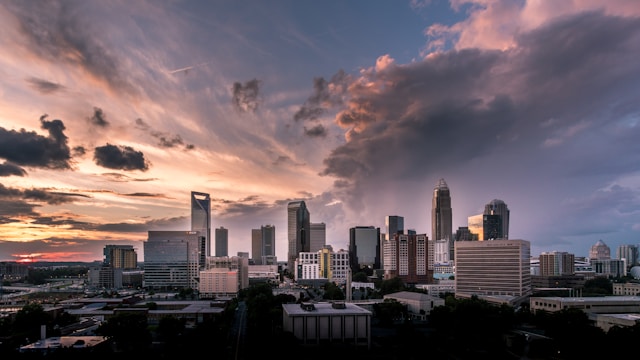Written by: Sanjin Hadziomerovic
North Carolina is one of the Southeast’s most popular states for short-term rental (STR) investing — offering a mix of bustling metros like Charlotte and Raleigh, scenic college towns like Boone, and year-round vacation destinations like Asheville and Banner Elk.
Whether you’re renting a cabin in the Blue Ridge Mountains or a modern apartment in Uptown Charlotte, understanding local regulations is essential. That’s because North Carolina does not impose statewide Airbnb laws — instead, each city (and in some cases, counties) has its own rules on zoning, licensing, taxes, and enforcement.
In this guide, we break down short-term rental laws in Raleigh, Charlotte, Boone, Asheville, and Banner Elk, using regulation data directly from GetChalet.com. If you’re operating or buying a short-term rental in North Carolina, this guide will help you stay compliant — and profitable — in 2024 and beyond.
Raleigh: Vacation Rental License Required
Raleigh allows short-term rentals, but you’ll need to obtain a Vacation Rental License through the city to operate legally. This applies to any rental of an entire dwelling unit for less than 30 consecutive days. Homestays (renting part of your primary residence) fall under a different category and have more lenient rules.
In addition to applying for the license, operators must:
- Verify that the unit is located in a zoning district that permits STRs
- Comply with building safety and fire codes
- Adhere to occupancy limits (typically two adults per bedroom)
- Follow local noise ordinances and trash regulations
Raleigh’s short-term rental rules are evolving, and enforcement has increased in recent years. The city is also collecting feedback from residents, which may lead to tighter restrictions. If you’re buying an Airbnb in Raleigh, be sure to confirm the zoning status and complete the full licensing process before listing.
Airbnb Rental Regulations Raleigh
Charlotte: Occupancy Taxes and Zoning Matter
Charlotte is a booming city with year-round demand from both business and leisure travelers. While short-term rentals are permitted, hosts are required to collect and remit occupancy taxes for any rental lasting fewer than 90 days.
As of 2024, the city’s STR regulations emphasize:
- Zoning compliance — STRs are allowed in many residential and mixed-use areas, but not all
- State and local occupancy tax collection — typically 7%–8%
- Safety code compliance, including smoke detectors and emergency egress
The city has not implemented a specific STR license yet, but that could change. Investors should watch for updates from the Charlotte City Council as STR growth continues to accelerate. In the meantime, it’s critical to stay on top of tax obligations and to avoid operating in restricted zones.
Airbnb Rental Regulations Charlotte
- 📊 Which Airbnb rental markets are set to outperform in 2025 based on revenue growth, occupancy trends, and supply shifts.
- 🏡 Where home prices are still affordable while generating high rental income.
- 📈 How to identify markets with strong appreciation potential for both short-term cash flow and long-term gains.

Boone: A Quiet Market with Strict Nuisance Enforcement
Boone is one of North Carolina’s most beautiful mountain towns, and it draws thousands of visitors year-round for hiking, skiing, and its college-town vibe (Appalachian State University). It’s also a highly desirable short-term rental market — but one with increasing residential protections in place.
The town’s focus is on preserving neighborhood character, and STRs are subject to:
- Strict noise and nuisance rules, especially during evening hours
- Trash and parking enforcement that applies to guests
- Zoning rules that restrict where STRs can legally operate
Unlike larger cities, Boone doesn’t have a formal licensing system, but it does regulate STRs through land use codes and enforcement of nuisance violations. Complaints from neighbors can trigger enforcement, fines, or the suspension of STR rights.
Investors in Boone should verify zoning, consider hiring a local property manager, and ensure their listing includes clear house rules for guests.
Airbnb Rental Regulations Boone
Asheville: One of NC’s Most Regulated Airbnb Markets
Asheville is a popular STR destination known for its mountain views, vibrant arts scene, and microbrewery culture. But it’s also one of the most regulated STR markets in the state.
The city divides short-term rentals into two categories:
- Homestays – Owner lives on-site and rents part of the home
- Whole-home rentals – Allowed only in specific commercial zones and tightly restricted elsewhere
To operate legally, you must obtain a STR permit and comply with:
- Strict zoning limitations (whole-home STRs are banned in most residential zones)
- Occupancy limits
- Parking and fire safety codes
- Permit display requirements (your permit ID must be included on your Airbnb listing)
The city conducts enforcement sweeps and actively cracks down on unpermitted STRs. If you’re investing in Asheville, understanding the exact zoning code of your property is non-negotiable. For homestays, the rules are easier — but still require registration and inspection.
Airbnb Rental Regulations Asheville
Banner Elk: Investor-Friendly with Minimal Barriers
Compared to other North Carolina markets, Banner Elk offers a more relaxed approach to short-term rentals. This small mountain town — known for its ski resorts and summer getaways — currently maintains a pro-investor environment, with few restrictions on STR activity.
Key takeaways:
- No STR license currently required at the town level
- Properties must still follow fire and building safety standards
- Local ordinances can apply to trash, noise, and guest behavior
- Taxes must be collected and remitted where applicable
Because the town has not yet imposed zoning-based STR bans, Banner Elk remains one of the more flexible markets in the state. That said, investors should be proactive — future tourism growth may bring about new regulations, and HOA or neighborhood rules may still apply.
Airbnb Rental Regulations Banner Elk
Final Thoughts: North Carolina STR Laws Are Local — and Changing
Short-term rental laws in North Carolina are changing fast. Some cities, like Asheville, have implemented tight restrictions to preserve neighborhood feel. Others, like Banner Elk and Boone, remain relatively open — but with strong enforcement around nuisance issues and zoning.
As an investor or host, your biggest asset is knowledge. To protect your listing and your revenue stream:
- Know the zoning code for your property
- Apply for permits or licenses where required
- Stay compliant with local tax and safety regulations
- Monitor city updates — regulations are constantly evolving
Want to streamline your research? Check out the Chalet STR Regulation Center for deep dives into each city, links to permits, tax info, and investor tips for all North Carolina STR markets.


